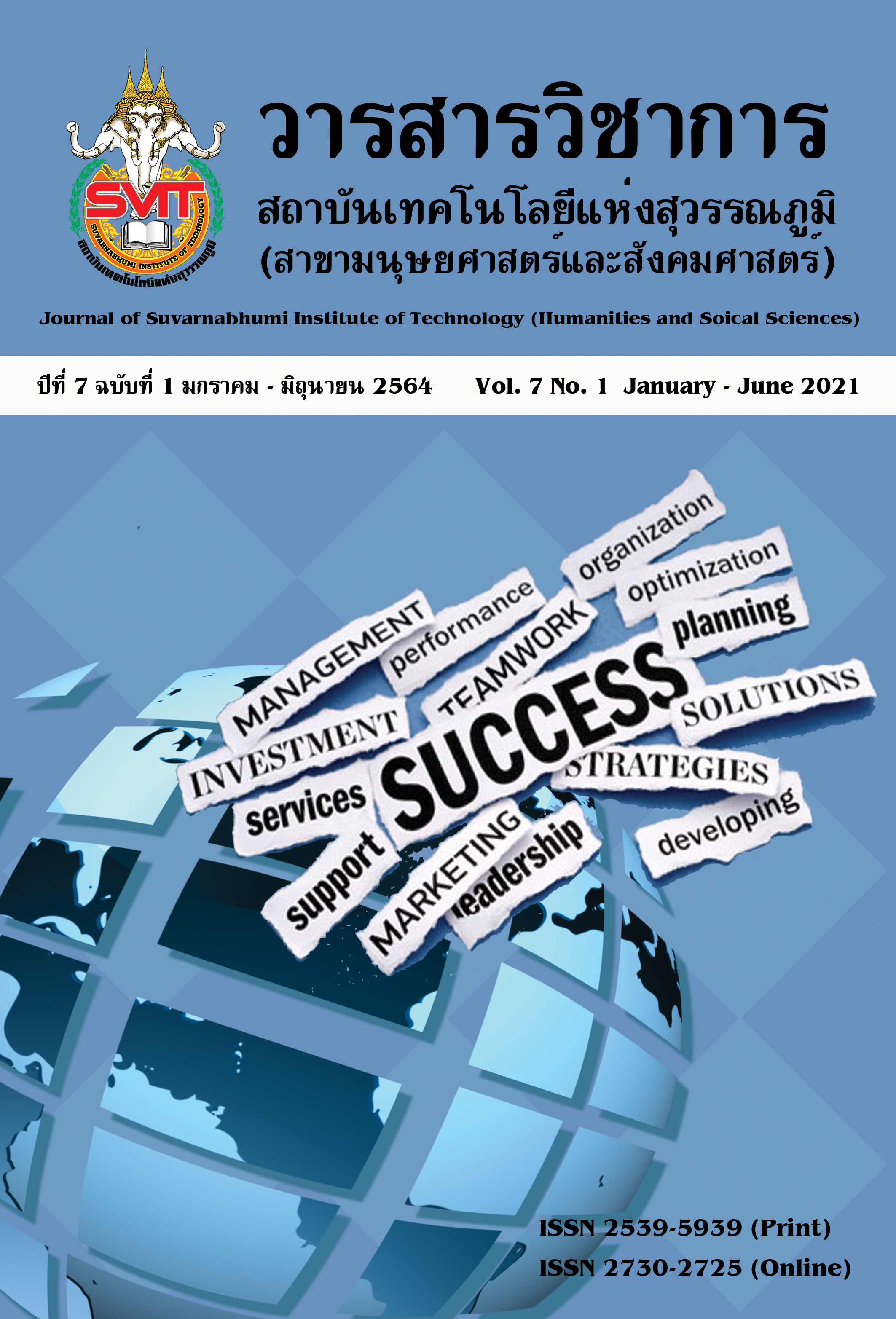NEW ENTREPRENEURIAL MODEL OF UNDERGRADUATE UNIVERSITY STUDENTS IN BANGKOK METROPOLITAN REGION
Keywords:
new entrepreneur, model of new entrepreneurial development, bachelorAbstract
This research were aimed; 1) to study factors influencing new entrepreneurs of undergraduate students in universities in Bangkok Metropolitan Region. 2) to study guidelines for developing new entrepreneurial models of undergraduate students in universities in Bangkok Metropolitan Region. It’s a mixed research as quantitative and qualitative research. The sample of quantitative research was 760 undergraduate students. The qualitative research interviewed key informats were executives/owners of SMEs, executives of public and private sectors in business development startups or academics in institutions that have launched a program of 15 persons. The questionnaires and in-depth interview forms has been used as the data collection instrument. The statistics used in quantitative data analysis were frequency, percentage, standard deviation and pearson’s correlation coefficient. The qualitative research was analyzed by content analysis and description method.
The result of the study found that the factors influencing undergraduate students intent to become a new entrepreneur affiliated with universities in Bangkok Metropolitan Region the overall is at a moderate level and the relationship between factors influencing the intention to become a new entrepreneur in the economy. There was a relationship or influence with the new entrepreneurial development model of undergraduate students at the statistical significance level of .05. The guideline for developing a new entrepreneurial model for undergraduates. The steps are as follows. Step 1 Creating and training startup entrepreneurs consisting of 1) review the course of study, examinations in current higher education institutions to be up-to-date, deep pace with global changes. 2) organize a course with a focus on practice, train students to invent, research and execute start-up business project. Step 2 Set up an action plan and develop startups that are consistent with student potential under both quantitative and qualitative indicators. It consists of 1) the improvement plan for the cognitive ability in behavioral control. 2) the improvement plan for the analysis of the external economic environment. 3) the implementation in accordance with the government policy and the 12th socio-economic development plan focusing on promote the development of innovation and technology accelerate investment with research and development from university, educational institutes and to promote an innovative ecosystem that is conductive to fostering innovation to drive national development in all areas. And Step 3 Inspection, monitoring and evaluation in order to define measures for monitoring and evaluating the performance of the project.
References
กฤติน โกยวิริยะกุล. (2559). ความตั้งใจในการผันตัวเป็นผู้ประกอบการธุรกิจสตาร์ทอัพของนักพัฒนาซอฟต์แวร์ (การค้นคว้าอิสระวิทยาศาสตรมหาบัณฑิต). มหาวิทยาลัยธรรมศาสตร์.
ชีวัน ทองสอดแสง, ประภัสสร สมอออน, อาทิตย์ ฉัตรชัยพลรัตน์ และคนอื่นๆ. (2560). แนวทางการพัฒนาความรู้สู่การเป็นผู้ประกอบการหน่วยบ่มเพาะวิสาหกิจภาคตะวันออกเฉียงเหนือตอนบนในประเทศไทย. วารสารวิทยาลัยบัณฑิตเอเชีย, 7(ฉบับพิเศษ), 2-10.
สำนักงานเลขาธิการสภาการศึกษา, กระทรวงศึกษาธิการ. (2561). การจัดการศึกษาเพื่อพัฒนาความเป็นผู้ประกอบการ (รายงานวิจัย). กรุงเทพฯ: บริษัท พริกหวานกราฟฟิค จำกัด.
Aujirapongpan, S. Vadhanasindhu, P., Chandrachai, A., & Cooparat, P. (2010). Nawattakam: Khwammaipraphetlaekhwamsomkham tokan pen Phuprakopkan [Innovation: Definition, Categories and importance of entrepreneurship]. Journal of Business Administration, 33(128),49-65.
Covin, J.G., & Slevin, D.P. (1991). Strategic management of small firms in hostitle and benign environment. Strategic Management Journal, 10(1), 75-87.
Crantt,J.M. (1996). The proactive personality scale as a predictor of entrepreneurial intention. Journal of Small Business Management, 34(2), 42-49
Kyambalesa Henry. (2003). Successful Marketing in the 21st Century. New Delhi: Infinity Books.
Office of SMEs Promotion. (2017). Niyam SMEs [Definition of SMEs]. Retrieved April 14, 2017, from http://www.sme.go.th/th/index.php/aboutosmep/Law-osmep/136-cat-definesmes/523-art-define-smes.
Sekaran, U., & Bougie, R. (2010). Research methods for business: A skill building approach. West Sussex, UK : John Wiley & Sons.
Welch, & Comer. (1983). Sampling in Auditing. New York: Ronald Press.
Zikmud, W.G. (2003). Business research methods. Cincinnati, OH: South-Western Thomson.
Downloads
Published
Issue
Section
License
The articles published are copyrighted by the Sarasas Journal of Humanities and Social Science. The opinions expressed in each article in this academic journal are those of the individual authors and do not reflect the views of Sarasas Suvarnabhumi Institute of Technology. The authors are solely responsible for all aspects of their respective articles. Any errors or inaccuracies in the articles are the sole responsibility of the authors.



